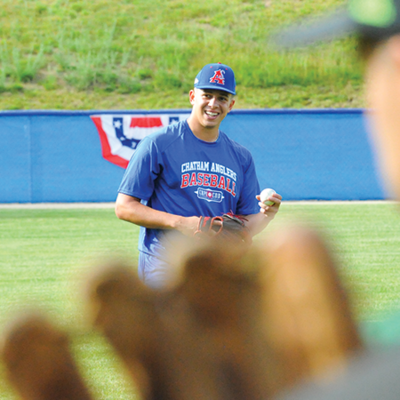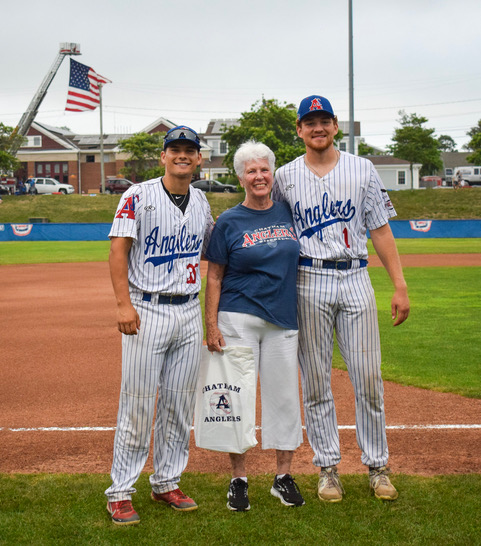Anglers News« Back to 2022 News Archives |
Villaman didn't make his varsity team as a freshman. But that helped him in the long run.

Chris Villaman's varsity arrival came at the largest stage. In the Final Four of the 2016 North Carolina Baseball Championships, Ledford High School deployed the then-unknown Villaman to start against Marvin Ridge High School.
He expected the call-up a few months earlier when he started ninth grade. Instead, the coaching staff decided to keep him on junior varsity. Villaman was confused by the decision as he had the ability, Ledford pitching coach Justin Livengood said, but he had to prove himself through six junior varsity starts.
Villaman's first pitch against Marvin Ridge didn't land as planned either. The fastball he had spent years refining was hit for a double. But he settled in, striking out the next three batters en route to a 7-4 win.
'It was just a reason for me to mature,' Villaman said about beginning his career on junior varsity, joking that he was given the 'Michael Jordan' treatment. 'I'm grateful for it.'
Villaman credited his time on junior varsity to helping his mental development, and the Marvin Ridge game as the kickstart to his career. His dad, Eddie Villaman, was emotional at his son's first start, seeing the training the pair had put in over the past five years unfold in the state semifinals. Villaman's notoriety skyrocketed as he became an all-state selection the next three seasons, a notable closer at North Carolina State and now Saturday's starter with the Chatham Anglers.
Livengood drilled Villaman's pitching mechanics in bullpens during Villaman's time on junior varsity, working on the ability to not just throw as fast as possible, but how to get guys off balance. And even if Villaman struck out 10 or more batters while allowing only a couple hits in an outing, Livengood said he'd ask him about a single pitch he didn't place right with a 1-2 count.
As Villaman continued through Ledford's programs, the conversations after games between Villaman and Livengood would become less one-sided, Livengood said. Villaman would recognize why certain pitches were called from the dugout, coming off the mound knowing the exact change-up he had misplaced.
'There's not many guys that will strike out 12 to 13 high school hitters and be pissed off because he didn't locate the fastball like he wanted to on his last three batters,' Ledford head coach Kevin Goss said. 'You could tell that it bothered (Villaman) to a healthy degree to push him for his next outing.'
The attention to detail stemmed back to when Villaman was 10, his mom Rosaly Cabrera said, after a High Point University coach made Villaman's parents aware of the talent Villaman possessed. He would start to practice with Eddie after he finished work, starting in their backyard before moving to the nearby little league and high school fields. Villaman also focused on his batting at that time by repeatedly hitting the side of a tire. He finished his career at Ledford with a .492 average and 38 RBIs.
Villaman headed to the high school field with his dad and a tee, changing the height and location to cover the entirety of the strike zone. Sometimes, Villaman said he would do 'dry work,' closing his eyes before letting go of the ball and seeing if he hit the right spot. Eddie even created a makeshift catcher with nine holes, each a different color, for Villaman to aim at.
'He was really good at locating the balls already at like 11 or 12,' Eddie said.
Outside of their field or backyard, Villaman and Eddie emphasized Villaman's ability to win the mental game. Villaman said baseball is 80% mental. When he was anxious ' the most nerve racking of those situations being his first varsity start ' Villaman utilized the breathing techniques Eddie read about from athletes like Kobe Bryant and Pedro Martinez.
'If you don't have (the mental game) it doesn't matter how much talent you have, it's going to beat you pretty good,' Villaman said.
It helped that Villaman only had to focus on two pitches ' the fastball and change-up. Eddie feared that throwing breaking balls too early would stunt the growth of Villaman's arm, so he didn't start adding curveballs or sliders to his arsenal until late in high school. Instead, he mastered the placement of his fastball on junior varsity, fine tuning it more each year after that.
'When you can pitch and trust your mechanics to locate and you can pitch on both sides of the plate that's kind of like having two pitches,' Ledford head coach Kevin Goss said.
Though Villaman started most games at Ledford, Goss called him a 'swiss army knife' because of his ability to stay composed in whatever situation the team needed him to pitch. Villaman said he was good at being efficient, only walking one batter for every 25 strikeouts. At North Carolina State, Villaman notched a team-best 11 saves, but his first major close came a few years earlier in his junior season.
Against Randleman, Ledford held a 4-3 lead heading into the final inning. Villaman had pitched the week before, but the coaching staff called on him again to get the last three outs. The matchup happened to be a normal midweek game toward the end of the season, but it tested Villaman's mental toughness which was 'kind of fun' for him. And, unsurprisingly, he delivered.
'He can pitch five innings if you need him too,' Goss said. 'He can get two outs, one out or a four-out save. Whatever you need.'
In Chatham's opener this season, Villaman was challenged again. After Carson Whisenhunt and Jacob Watters allowed five runs in five innings, Villaman entered to stop the bleeding. He did just that, allowing one hit over 2.1 scoreless innings.
After the game, Villaman still wasn't satisfied with how his fastball landed up in the zone and his slider low in the zone.
'I want to earn my spots,' Villaman said.

